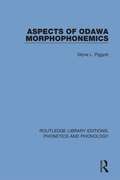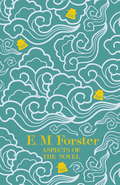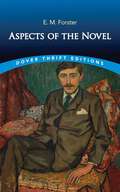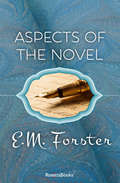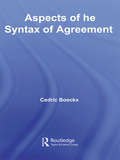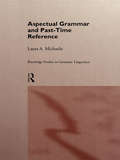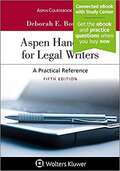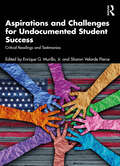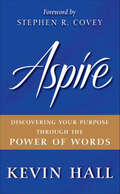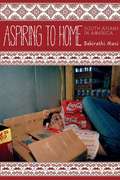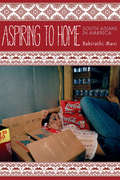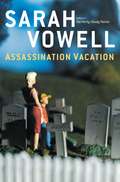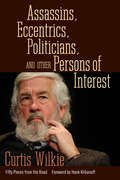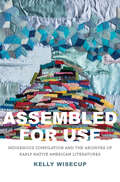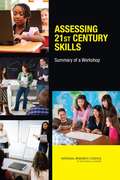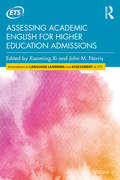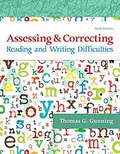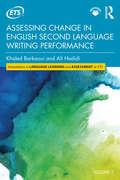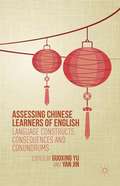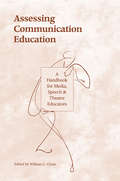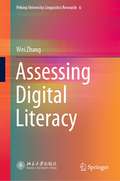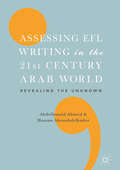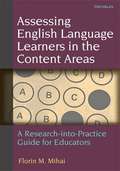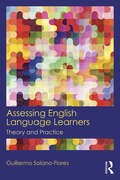- Table View
- List View
Aspects of Odawa Morphophonemics (Routledge Library Editions: Phonetics and Phonology #19)
by Glyne L. PiggottFirst published in 1980. This study investigates salient properties of the phonological structure of Odawa, a dialect of Ojibwa, in terms of their implications for phonological theory. Indeed, the primary concern is with theoretical issues, specifically with questions about the abstractness of phonological descriptions and about the ordering and application of phonological rules. This title will be of interest to students of language and linguistics.
Aspects of the Novel
by E M ForsterAspects of the Novel is a unique attempt to examine the novel afresh, rejecting the traditional methods of classification by chronology or subject-matter. 'His is a book to encourage dreaming.' Virginia Woolf Forster pares down the novel to its essential elements as he sees them: story, people, plot, fantasy, prophecy, pattern and rhythm. He illustrates each aspect with examples from their greatest exponents, not hesitating as he does so to pass controversial judgement on the works of, among others, Sir Walter Scott, Charles Dickens and Henry James. Full of Forster's renowned wit and perceptiveness, ASPECTS OF THE NOVEL offers a rare insight into the art of fiction from one of our greatest novelists.
Aspects of the Novel
by E M ForsterAspects of the Novel is a unique attempt to examine the novel afresh, rejecting the traditional methods of classification by chronology or subject-matter. 'His is a book to encourage dreaming.' Virginia Woolf Forster pares down the novel to its essential elements as he sees them: story, people, plot, fantasy, prophecy, pattern and rhythm. He illustrates each aspect with examples from their greatest exponents, not hesitating as he does so to pass controversial judgement on the works of, among others, Sir Walter Scott, Charles Dickens and Henry James. Full of Forster's renowned wit and perceptiveness, ASPECTS OF THE NOVEL offers a rare insight into the art of fiction from one of our greatest novelists.
Aspects of the Novel (Dover Thrift Editions: Literary Collections)
by E. M. ForsterE. M. Forster, one of England’s most distinguished writers, delivered a series of lectures at Trinity College in 1927. The lectures were compiled in a collection of literary essays, Aspects of the Novel. Forster shares what he believes are the seven important aspects of fiction: story, people, plot, fantasy, prophecy, pattern, and rhythm. He uses literary examples to make his points, including Jane Austen, Charles Dickens, and Marcel Proust, and his commentary is engaging, witty, and conversational. This is not a how-to guide to novel writing but rather an exploration of the elements that make a novel successful.
Aspects of the Novel (Dover Thrift Editions: Literary Collections)
by E. M. ForsterThe renowned British novelist&’s &“casual and wittily acute guidance&” on reading—and writing—great fiction (Harper&’s Magazine). Renowned for such classics as A Room with a View, Howards End, and A Passage to India, E. M. Forster was one of Britain&’s—and the world&’s—most distinguished fiction writers, a frequent nominee for the Nobel Prize in Literature. In this collection of lectures delivered at Trinity College, Cambridge, in 1927, he takes a wide-ranging look at English-language novels—with specific examples from such masters as Dickens and Austen—discussing the elements they all have in common. Using a witty, informal tone and drawing on his extensive readings in French and Russian literature, Forster discusses his ideas in reference to such figures as Tolstoy, Dostoevsky, and Proust; explains the difference between &“flat&” and &“round&” characters and between plot and story; and ultimately provides an &“admirable and delightful&” education for anyone who appreciates the art of a good book (The New York Times).
Aspects of the Syntax of Agreement (Routledge Leading Linguists)
by Cedric BoeckxThis volume brings together various strands of research focusing on aspects of the syntax of agreement, and the role that agreement plays in linguistic theory. The essays collected here show how and why agreement has emerged in recent years as the central theoretical construct in minimalism. Although the theoretical context of the volume is minimalist in character, Boeckx formulates formal and substantive universals in the domain of agreement.
Aspectual Grammar and Past Time Reference (Routledge Studies in Germanic Linguistics #Vol. 4)
by Laura A. MichaelisThis study presents a semantic framework for analysing all aspectual constructions in terms of the event state distinction, and describes the grammatical expression of aspectual meaning in terms of a theory of grammatical constructions. In this theory, grammatical constructions, like words, are conventionalized form-meaning pairs, which are best described not only with respect to their intrinsic semantic values, but also with respect to the functional oppositions in which they participate.
Aspen Handbook for Legal Writers: A Practical Reference
by Deborah E. BouchouxThe Aspen Handbook for Legal Writers is the concise reference students turn to again and again. <p><p> Deborah E. Bouchoux’s straightforward exposition, examples, and exercises cover every stage of the writing process. Practical tips and strategies clarify gray areas and shed light on important details that are frequently overlooked. Numerous examples throughout the text highlight the differences between ineffective and effective legal writing. , and the ethical implications of using social media New sample documents, including a demand letter, an email letter, and an email memo Coverage of Zoom-type conferences, as part of electronic communications.
Aspirations and Challenges for Undocumented Student Success: Critical Readings and Testimonios
by Enrique G. Murillo Sharon Velarde PierceAspirations and Challenges for Undocumented Student Success offers a comprehensive review of rigorous, innovative, and critical scholarship profiling the scope and terrain on undocumented student success. Compiling the most significant work in the field in terms of its contributions to research and professional practice, the volume opens with an exploration the aspirations of undocumented students and the fight for equity, followed by an examination of the impact and influence of parents and families on educational outcomes. Finally, it concludes with testimonios reflecting on the educational experiences of undocumented students in America. Each section presents readings in chronological order, demonstrating the progression around undocumented student success in the field over the past 20+ years, in respect to the intentionality about integrating undocumented student success throughout equity initiatives, breaking down institutional silos, fostering welcoming campus environments, and advocating for solutions that allow undocumented students to achieve economic mobility in both policy and practice. This text is a must-have resource for graduate students and researchers in Educational Leadership and Policy, Multicultural Education, and Teacher Education. It will also be important reading for educational leaders, teachers, counselors, administrators, and organizations that share a common interest in and commitment to the educational issues that impact undocumented students and their families.
Aspire: Discovering Your Purpose Through the Power of Words
by Kevin Hall&“Hall shows us the surprising power of words—tools we can use to shape new thoughts and beliefs—to help us change.&” —Spencer Johnson, #1 New York Times–bestselling author We live our lives word by word—to build our relationships, to convey our points of view, to object to wrongs done to us or to others, to comfort our children and our friends. We also use the wrong words—sometimes unknowingly—and get ourselves into situations we&’d rather not be in. As Stephen R. Covey points out in his introduction: Words sell and words repel Words lead and words impede Words heal and words kill Kevin Hall discovered the deeper power inherent in words after a fateful encounter with a wise shopkeeper in Vienna. When that led to an introduction to an esteemed etymologist residing in a senior home, Hall embarked on a project that changed his life, and has since changed the lives of thousands of readers. Discover the eleven words—as well as the secret word—that when used correctly, can light your path to the lifelong success you deserve.&“Aspire has the power to help individuals and teams focus on their true purpose and reach their best and highest aspirations.&” —Richard Paul Evans, #1 New York Times–bestselling author of The Christmas Box&“Aspire is one of those truly great books that changed my life. Kevin Hall is right up there with Og Mandino and Napoleon Hill.&” —Bob Proctor, teacher in The Secret, bestselling author of You Were Born Rich
Aspiring to Home: South Asians in America
by Bakirathi ManiWhat does it mean to belong? How are twenty-first-century diasporic subjects fashioning identities and communities that bind them together? Aspiring to Home examines these questions with a focus on immigrants from India, Pakistan, and Bangladesh. Advancing a theory of locality to explain the means through which immigrants of varying regional, religious, and linguistic backgrounds experience what it means to belong, Bakirathi Mani shows how ethnicity is produced through the relationship between domestic racial formations and global movements of class and capital. Aspiring to Home focuses on popular cultural works created by first- and second-generation South Asians from 1999–2009, including those by author Jhumpa Lahiri and filmmaker Mira Nair, as well as public events such as the Miss India U.S.A. pageant and the Broadway musical Bombay Dreams. Analyzing these diverse productions through an interdisciplinary framework, Mani weaves literary readings with ethnography to unravel the constraints of form and genre that shape how we read diasporic popular culture.
Aspiring to Home: South Asians in America
by Bakirathi ManiWhat does it mean to belong? How are twenty-first-century diasporic subjects fashioning identities and communities that bind them together? Aspiring to Home examines these questions with a focus on immigrants from India, Pakistan, and Bangladesh. Advancing a theory of locality to explain the means through which immigrants of varying regional, religious, and linguistic backgrounds experience what it means to belong, Bakirathi Mani shows how ethnicity is produced through the relationship between domestic racial formations and global movements of class and capital. Aspiring to Home focuses on popular cultural works created by first- and second-generation South Asians from 1999–2009, including those by author Jhumpa Lahiri and filmmaker Mira Nair, as well as public events such as the Miss India U.S.A. pageant and the Broadway musical Bombay Dreams. Analyzing these diverse productions through an interdisciplinary framework, Mani weaves literary readings with ethnography to unravel the constraints of form and genre that shape how we read diasporic popular culture.
Assassination Vacation
by Sarah VowellSarah Vowell exposes the glorious conundrumsof American history and culture with wit, probity, and an irreverent sense of humor. With Assassination Vacation, she takes us on a road trip like no other -- a journey to the pit stops of American political murder and through the myriad ways they have been used for fun and profit, for political and cultural advantage. From Buffalo to Alaska, Washington to the Dry Tortugas, Vowell visits locations immortalized and influenced by the spilling of politically important blood, reporting as she goes with her trademark blend of wisecracking humor, remarkable honesty, and thought-provoking criticism. We learn about the jinx that was Robert Todd Lincoln (present at the assassinations of Presidents Lincoln, Garfield, and McKinley) and witness the politicking that went into the making of the Lincoln Memorial. The resulting narrative is much more than an entertaining and informative travelogue -- it is the disturbing and fascinating story of how American death has been manipulated by popular culture, including literature, architecture, sculpture, and -- the author's favorite -- historical tourism. Though the themes of loss and violence are explored and we make detours to see how the Republican Party became the Republican Party, there are all kinds of lighter diversions along the way into the lives of the three presidents and their assassins, including mummies, show tunes, mean-spirited totem poles, and a nineteenth-century biblical sex cult.
Assassins, Eccentrics, Politicians, and Other Persons of Interest: Fifty Pieces from the Road
by Curtis WilkieWriting as a newspaper reporter for nearly forty years, Curtis Wilkie covered eight presidential campaigns, spent years in the Middle East, and traveled to a number of conflicts abroad. However, his memory keeps turning home and many of his most treasured stories transpire in the Deep South. He called his native Mississippi, “the gift that keeps on giving.” For Wilkie, it represented a trove of rogues and racists, colorful personalities and outlandish politicians who managed to thrive among people otherwise kind and generous. Assassins, Eccentrics, Politicians, and Other Persons of Interest collects news dispatches and feature stories from the author during a journalism career that began in 1963 and lasted until 2000. As a young reporter for the Clarksdale Press Register, he wrote many articles that dealt with the civil rights movement, which dominated the news in the Mississippi Delta during the 1960s.Wilkie spent twenty-six years as a national and foreign correspondent for the Boston Globe. One of the original “Boys on the Bus” (the title of a best-selling book about journalists covering the 1972 presidential campaign), he later wrote extensively about the winning races of two southern Presidents, Jimmy Carter and Bill Clinton. Wilkie is known for stories reported deeply, rife with anecdotes, physical descriptions, and important background details. He writes about the notorious, such as the late Hunter S. Thompson, as well as more anonymous subjects whose stories, in his hands, have enduring interest. The anthology collects pieces about several notable southerners: Ross Barnett; Byron De La Beckwith and Sam Bowers; Billy Carter; Edwin Edwards and David Duke; Trent Lott; and Charles Evers. Wilkie brings a perceptive eye to people and events, and his eloquent storytelling represents some of the best journalistic writing.
Assembled for Use: Indigenous Compilation and the Archives of Early Native American Literatures (The Henry Roe Cloud Series on American Indians and Modernity)
by Kelly WisecupA wide-ranging, multidisciplinary look at Native American literature through non-narrative texts like lists, albums, recipes, and scrapbooks &“An intricate history of Native textual production, use, and circulation that reshapes how we think about relationships between Native materials and settler-colonial collections.&”—Rose Miron, D&’Arcy McNickle Center for American Indian and Indigenous Studies at the Newberry Library Kelly Wisecup offers a sweeping account of early Native American literatures by examining Indigenous compilations: intentionally assembled texts that Native people made by juxtaposing and recontextualizing textual excerpts into new relations and meanings. Experiments in reading and recirculation, Indigenous compilations include Mohegan minister Samson Occom&’s medicinal recipes, the Ojibwe woman Charlotte Johnston&’s poetry scrapbooks, and Abenaki leader Joseph Laurent&’s vocabulary lists. Indigenous compilations proliferated in a period of colonial archive making, and Native writers used compilations to remake the very forms that defined their bodies, belongings, and words as ethnographic evidence. This study enables new understandings of canonical Native writers like William Apess, prominent settler collectors like Thomas Jefferson and Henry Rowe Schoolcraft, and Native people who contributed to compilations but remain absent from literary histories. Long before current conversations about decolonizing archives and museums, Native writers made and circulated compilations to critique colonial archives and foster relations within Indigenous communities.
Assessing 21st Century Skills: Summary of a Workshop
by Judith Anderson KoenigThe routine jobs of yesterday are being replaced by technology and/or shipped off-shore. In their place, job categories that require knowledge management, abstract reasoning, and personal services seem to be growing. The modern workplace requires workers to have broad cognitive and affective skills. Often referred to as "21st century skills," these skills include being able to solve complex problems, to think critically about tasks, to effectively communicate with people from a variety of different cultures and using a variety of different techniques, to work in collaboration with others, to adapt to rapidly changing environments and conditions for performing tasks, to effectively manage one's work, and to acquire new skills and information on one's own. The National Research Council (NRC) has convened two prior workshops on the topic of 21st century skills. The first, held in 2007, was designed to examine research on the skills required for the 21st century workplace and the extent to which they are meaningfully different from earlier eras and require corresponding changes in educational experiences. The second workshop, held in 2009, was designed to explore demand for these types of skills, consider intersections between science education reform goals and 21st century skills, examine models of high-quality science instruction that may develop the skills, and consider science teacher readiness for 21st century skills. The third workshop was intended to delve more deeply into the topic of assessment. The goal for this workshop was to capitalize on the prior efforts and explore strategies for assessing the five skills identified earlier. The Committee on the Assessment of 21st Century Skills was asked to organize a workshop that reviewed the assessments and related research for each of the five skills identified at the previous workshops, with special attention to recent developments in technology-enabled assessment of critical thinking and problem-solving skills. In designing the workshop, the committee collapsed the five skills into three broad clusters as shown below: Cognitive skills: nonroutine problem solving, critical thinking, systems thinking Interpersonal skills: complex communication, social skills, team-work, cultural sensitivity, dealing with diversity Intrapersonal skills: self-management, time management, self-development, self-regulation, adaptability, executive functioning Assessing 21st Century Skills provides an integrated summary of the presentations and discussions from both parts of the third workshop.
Assessing Academic English for Higher Education Admissions
by Xiaoming XiAssessing Academic English for Higher Education Admissions is a state-of-the-art overview of advances in theories and practices relevant to the assessment of academic English skills for higher education admissions purposes. The volume includes a brief introduction followed by four main chapters focusing on critical developments in theories and practices for assessing reading, listening, writing, and speaking, of which the latter two also address the assessment of integrated skills such as reading-writing, listening-speaking, and reading-listening-speaking. Each chapter reviews new task types, scoring approaches, and scoring technologies and their implications in light of the increasing use of technology in academic communication and the growing use of English as a lingua franca worldwide. The volume concludes with recommendations about critical areas of research and development that will help move the field forward. Assessing Academic English for Higher Education Admissions is an ideal resource for researchers and graduate students in language testing and assessment worldwide.
Assessing And Correcting Reading And Writing Difficulties
by Thomas GunningComprehensive, practical, and up to date, Assessing and Correcting Reading and Writing Difficulties presents a wealth of examples and thorough coverage of procedures for assessing and instructing below-level readers and writers from pre-k through grade 12. The book covers virtually all aspects of assessment, including basic concepts of tests and measurements; standardized measures, and informal but highly regarded techniques. The book’s thorough, practical coverage of instructional techniques includes approaches for working with readers and writers who have the most severe difficulties. Some 46 sample lessons covering virtually every essential skill are presented and accompanied by numerous suggestions for practice and reinforcement, including the use of technology. The text takes the position that with the right kind of instruction and reinforcement, virtually all students can learn to read and write complex text, which is the foundation for being college- and career-ready.
Assessing Change in English Second Language Writing Performance
by Khaled Barkaoui Ali HadidiThis book introduces a new framework for analyzing second language (L2) learners’ written texts. The authors conducted a major study on changes and differences in English L2 learners’ writing performance to advance understanding of the nature of L2 writing development over time, in relation to L2 instruction and testing, and to offer a model that professionals and researchers can use in their own longitudinal and cross-sectional studies of L2 writing development. Grounded in research, data, theory, and technology, this will be a welcome how-to for language test developers, scholars, and graduate students of (L2) writing and assessment.
Assessing Chinese Learners of English: Language Constructs, Consequences And Conundrums
by Guoxing YuThis volume gathers researchers from around the world endeavouring to better understand a number of perennial issues in assessing Chinese learners of English, covering topics such as students' test performances, interactional competence and lexical knowledge, students' motivation, teachers' attitudes and assessment policy changes.
Assessing Communication Education: A Handbook for Media, Speech, and Theatre Educators (Routledge Communication Series)
by William G. ChristDesigned as a handbook, this text provides media, speech (public speaking, interpersonal, small group, and organizational communication), and theatre educators with both the theoretical and practical ammunition to fight the assessment battles on their campuses. The philosophical implications of accountability are balanced with concrete, specific, and usable assessment strategies. Stressing student, faculty, course, program, department, and institutional assessment, this book's aim is to provide, in one place, information that will help diverse and complex communication programs face the growing challenges in assessment. The book is divided into three sections: background and foundational information for assessment; broad assessment strategies that apply to a variety of media, "speech," and theatre courses and programs; and context-specific assessment strategies. While covering a host of topics, it: * provides an overview of assessment and suggests how it might impact communication education, * discusses the elements of program assessment and how linkage of mission statements with outcomes can lead to strong, innovative programs, * compares and contrasts regional association requirements and presents a specific how-to strategy for writing outcome statements, * discusses teaching evaluation and argues that we need to identify the "what" of teaching before we try to measure the "how," * looks at creative ways for formative and summative course evaluation that starts with the creation of an explicit syllabus, * discusses the use of capstone courses as a way of evaluating not only their major but also how students have integrated their "total" educational experience, * suggests the variety of ways that interpersonal communication can be assessed and calls for future research that stresses the "knowledge" component of learning, * reports on a strategy for developing small group communication assessment measures, and * provides media, speech, and theatre faculty and administrators with the background, understanding and tools to build stonger programs and develop better courses and educational experiences for their students.
Assessing Digital Literacy (Peking University Linguistics Research #6)
by Wei ZhangThis book introduces the design and implementation of an assessment model for a new university-level English curriculum in China that aims at developing digital literacy skills. The assessment approach, embedded in the curriculum of an online modular course at Peking University, requires the students to conduct semester-long digital research projects in English in their major fields of study. Combining quantitative and qualitative methods, evaluation rubrics built around Content, Clarity, and Creative/Critical Thinking were developed, evaluated, and refined over three implementation cycles (eight semesters). The book presents a systematic assessment design framework, a set of effective rubrics for evaluating the digital research project, and authentic examples of written and multimedia presentations by Chinese students. Integrating assessment with instruction and technology, the book provides a valuable practical guide to digital literacy assessment for English education in the Outer and Expanding Circle contexts.
Assessing EFL Writing in the 21st Century Arab World: Revealing the Unknown
by Abdelhamid Ahmed Hassan AbouabdelkaderThis book empirically explores assessment of EFL (English as a Foreign Language) writing in different Arab world contexts at the university level, which often presents a challenge for teachers and students alike. Analysing a number of different practices throughout the chapters including peer assessment, self-assessment, e-rubrics and writing coherence, the authors highlight different issues and challenges that affect the assessment of EFL writing in the Arab world, and provide valuable insights into how it can be improved. This book is sure to become an important practical resource for practitioners, researchers, professors and graduate students working on EFL writing in this region.
Assessing English Language Learners In The Content Areas: A Research-into-practice Guide For Educators
by Florin MihaiAssessing English Language Learners in the Content Areas: A Research-into-Practice Guide for Educators seeks to provide guidance to classroom teachers, staff developers, and test-item designers who want to improve ELL assessment outcomes, particularly in the areas of math, science and social studies. The first two chapters of the book establish the background for the discussion of content-area assessment for ELLs, examining several important characteristics of this rapidly growing student population (as well as critical legislation affecting ELLs) and providing a description of various forms of assessment, including how ELL assessment is different from the assessment of English-proficient students Important assessment principles that educators should use in their evaluation of tests or other forms of measurement are provided. Other chapters review ELL test accommodations nationwide (because, surprisingly, most teachers do not know what they can and cannot allow) and the research on the effectiveness of these types of accommodations. The book analyzes the characteristics of alternative assessment; it discusses three popular alternative assessment instruments (performance assessment, curriculum-based measurement, and portfolios) and makes recommendations as to how to increase the validity, reliability, and practicality of alternative assessments. The book proposes fundamental assessment practices to help content area teachers in their evaluation of their ELL progress.
Assessing English Language Learners: Theory and Practice
by Guillermo Solano FloresAssessing English Language Learners explains and illustrates the main ideas underlying assessment as an activity intimately linked to instruction and the basic principles for developing, using, selecting, and adapting assessment instruments and strategies to assess content knowledge in English language learners (ELLs). Sensitive to the professional development needs of both in-service and pre-service mainstream teachers with ELLs in their classrooms and those receiving formal training to teach culturally and linguistically diverse students, the text is designed to engage readers in viewing assessment as a critical part of teaching appreciating that assessments provide teachers with valuable information about their students’ learning and thinking becoming aware of the relationship among language, culture, and testing understanding the reasoning that guides test construction recognizing the limitations of testing practices being confident that assessment is an activity classroom teachers (not only accountability specialists) can perform Highlighting alternative, multidisciplinary approaches that address linguistic and cultural diversity in testing, this text, enhanced by multiple field-tested exercises and examples of different forms of assessment, is ideal for any course covering the theory and practice of ELL assessment.
